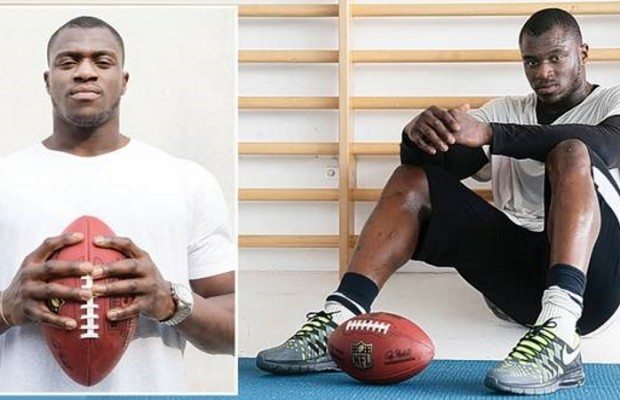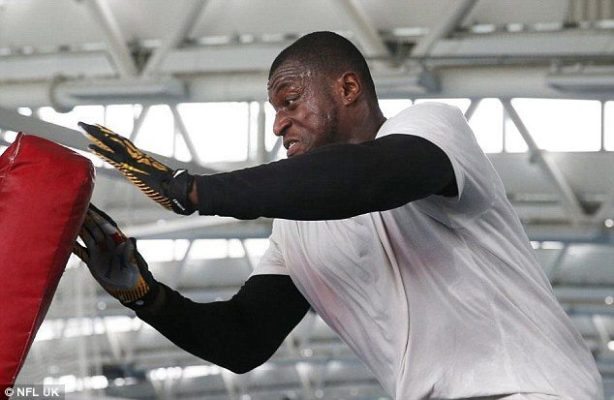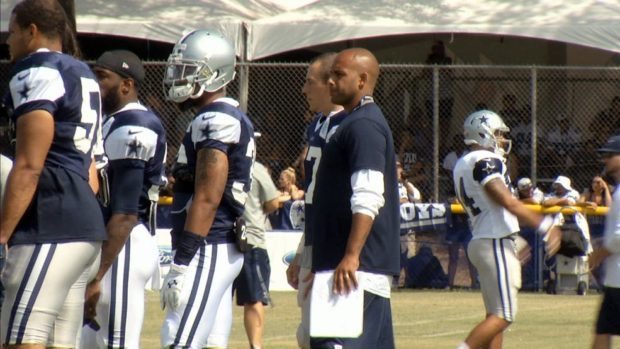MUST-READ! Abandoned in London, Now Living Dallas Dream

[tps_title]The amazing story behind the amazing story![/tps_title]
Story originally published on the NFL UK website.
Unknown British player Efe Obada – who has been signed by the NFL’s Dallas Cowboys – has admitted his dream move to the United States could be a major turning point in his life and “feels like a movie.”
The 22-year-old, who was abandoned and left homeless on the streets of London at the age of 10, has played just five games in his short career with the London Warriors of the BAFA National Leagues. Yet he has done enough to impress ‘America’s Team’ after being spotted by Warriors defensive coordinator Aden Durde, who served as an intern coach with the Cowboys last summer.
Durde has spent the past six months working with the 6-foot-6, 255-pound Obada on playing defensive end or tight end when he arrives in Texas for the NFC East team’s rookie mini-camps in May.
Prior to signing with the Cowboys, Obada worked as a warehouse storeman for Grace Foods in Welwyn Garden City but has traded in his 40-hour-per-week job and the 6am shift starts for a shot at NFL stardom.
“This is a dream,” said Obada, who didn’t even begin playing American football until he joined the Warriors for the second half of the 2014 season and helped them win a national title. “It’s amazing and life-changing. It’s a major turning point in my life and feels like a movie.
This could be it – I can change my life. This is unreal – this doesn’t happen to people like me. I’ve never even been outside of London since I arrived in the UK.”
Obada has certainly endured a long and often-dangerous path to the NFL that saw him living homeless in London, being shipped from one family to another by social services throughout his teenage years and becoming embroiled in the capital’s gang culture.
Obada was trafficked to the UK by a friend of his mother’s in 2002. But within hours of arriving in London from the Netherlands, the 10-year-old and his 11-year-old sister were abandoned on the freezing and dark streets of Hackney.
“This lady just left us out on the streets,” Obada explained. “It was scary and we were lonely. We went to a tower block building and there was a security guard there. We explained our situation and he let us sleep in the foyer of the flats. We spent two or three nights sleeping in the foyer of that building and we only had our jackets to keep us warm. It was freezing.”
Via the security guard, Obada was able to get in touch with his mother in Amsterdam and she arranged for a family in Stockwell to take the two homeless children into their home.
Obada continued:
“We were then hoping that my mum would come to London and take control but she never did. We lived with this lady for about five years. The house was chaotic – the lady had five other children living there and then me and my sister.
It was a stressful environment and her children took precedence over us and we were like domestic slaves. We spent a lot of our time cleaning – it was not a good situation to be in.”
After living in Stockwell for five years, Obada and his sister went into social services when he was 15 years old. It was another stressful and challenging chapter in Obada’s life story.
“We were home-hopping and living with strangers,” Obada revealed. “When you haven’t got stability, you don’t trust people – you know where you’re living is not permanent and it’s not real and you feel they’re just getting paid to look after you. You develop trust issues and you develop your own little demons. It’s not a nice feeling to not be wanted and to not have that security and stability.
It made me angry. I developed a lot of anger. It made me a negative and pessimistic person. I didn’t really believe in myself and because I never had that family stability it led me to turn to friends in the area and that led me into gangs and running with the wrong people.”
After seeing three of his friends murdered right in front of him on the streets of London, Obada knew he had to make a choice about how he was going to live the rest of his life. He chose a path that led to the London Warriors and, now, the Dallas Cowboys of the NFL.
“My life could have gone bad or good and I decided I wasn’t going down that road,” Obada stressed. “I lost a lot of friends and I saw people coming and going and I decided that was not the life for me or my sister.
I decided to fix myself up, I found American football, found the London Warriors and they helped me to focus and turn my life around.”
The Warriors – who train in Selhurst and play their home games at Streatham & Croydon Rugby Club – work with at-risk youths in London and one of their goals is to get young people off the streets by playing American football. The hugely successful programme has seen the Warriors reach the last four national championship games, winning back-to-back league titles in 2013 and 2014.
After being introduced to the Warriors by a friend while studying business at Lambeth College, Obada proved to be a natural when he stepped onto the gridiron for the first time in 2014. And he relished the physical nature of the sport.
Obada explained:
“I didn’t really know anything about American football but I was told I had the physique and that I should try it. I fell in love with the sport. When I went to the first practice, I was just trying to get my frustration out and release some energy. I was congratulated for hitting somebody and I liked it.
I’m a very competitive person and when I went into the Warriors I attacked it 100 per cent because I saw where it could take me. I knew I was going to give it everything. It just felt right. In those moments when I was on the field, I felt at peace and I was happy. I wasn’t thinking about my life – I was just in the moment and I enjoyed that. I only played five games, but I recorded a lot of sacks!”
Having found American football, Obada is intent on remaining on course to chase his NFL dream. But would it be easy to slip back into his former life as a gang member?
“Very easy,” Obada remarked. “It still is very easy. I just stay focused. I’ve got good people around me who believe in me such as my partner, Imola Adeyemi, and a great mentor in Aden. They believe in me and keep me focused and on the right path. I just weigh up my options and feel like I have more to lose now than I did in the past.”
As he prepares to head to the United States to pursue his NFL dream, Obada is all too willing to serve as a role model for others who find themselves in trying situations.
“It’s definitely important for me to be a role model,” said Obada, who has been training between three to five hours per day when not working his shifts in the warehouse. “You need role models to inspire you.
I don’t want this to be about me – I’m not self-centred. I would just like my story to be an inspirational one because there are still people I know who are in that position I was once in and who haven’t got the opportunities that I have. I just want them to know that it is possible.”
Obada, who now lives in Stevanage, certainly has the raw physical tools to be a success in the NFL. His 40-yard dash time of 4.63 seconds would have put him second among tight ends at the recent NFL Combine and fourth among defensive ends. His 121-inch broad jump would have been the best among the tight ends who gathered in Indianapolis in February.
So what are his immediate goals as he heads to the Cowboys?
“I just want to make the team,” Obada concludes. “And then I want to get my first Super Bowl ring. I believe I can do it and I’m working hard. This is not something that has just been handed to me. I’m waking up at 6am every day and putting my body through a lot, I’m taking on criticism, I’m trying to get better and I’m trying to stay focused and motivated.
I’ve spent a lot of time and money investing in myself. You’ve got to reach for the stars and that’s what I’m going to do. I believe I can achieve anything that I put my mind to. I can change my life and other people’s lives and help inspire people.
I can be the person I believed I could be.”
This is the link to the original story in NFL UK.



